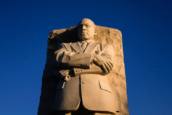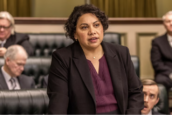
The Apology To The Stolen Generations, Ten Years On
First and Second Peoples in the Uniting Church have marked the 10th anniversary of the National Apology to the Stolen Generations by calling for urgent action on sovereignty, treaty, and Indigenous education.
President of the Uniting Aboriginal and Islander Christian Congress (UAICC) Rev. Garry Dronfield said the apology, “sent a message of hope for the future as we work towards treaty and sovereignty.”
“We must not forget that Aboriginal and Torres Strait Islander peoples and the members of our Stolen Generations and their families continue to feel the pain of the past,” Rev. Dronfield said.
The Uniting Church Assembly President Stuart McMillan has apologised again for the Uniting Church and its predecessors’ part in that pain.
“At the recent Uniting Aboriginal and Islander Christian Congress National Conference we heard stories told through showers of tears about the painful memories of the past,” said Mr McMillan.
“There is still so much more we have to do to truly correct the wrongs which former Prime Minister Kevin Rudd acknowledged and to give hope for healing.”
The Uniting Church made a formal apology to Aboriginal and Torres Strait Islander people in 1997.
s
Reliving the apology
Survivors from the Stolen Generations have made their way to Canberra to relive the tenth anniversary of the national apology speech, delivered by Australian Prime Minister Kevin Rudd.
One survivor, Michael Walsh, was taken from his family at the age of eight years old, reuniting with his mother when he was 17. Mr Walsh told the Sydney Morning Herald that the apology had helped him and his family heal from the trauma of his forced removal.
“It was a magical moment for me,” Mr Walsh said.
On 13 February 2008, Prime Minister Rudd moved a House of Representatives motion apologising to the Stolen Generations. This apology recognised that the Australian parliament had previously been complicit in the forced removal of indigenous Australians from their families.
“For the pain, suffering and hurt of these Stolen Generations, their descendants and for their families left behind, we say sorry,” Mr Rudd said during the speech.
Before the apology, the then-Uniting Church president Reverend Gregor Henderson commended the move. Rev. Henderson outlined the theological basis for confession.
“We take confession to mean that what has been done is not in accordance with the hopes and possibilities that God has for us,” Rev. Henderson said.
Then-National Administrator of the Uniting Aboriginal and Islander Christian Congress (UAICC), Rev. Shayne Blackman, said at the time that the apology was “greatly welcomed” but more needed to be done.
“As a first step, the apology will be an historic moment for Australia, and we hope to see a framework put in place, following the lead of countries like Canada and New Zealand where rights-based approaches have been successfully implemented,” Rev. Blackman said.
A fought-for apology
The apology to the Stolen Generations was an election promise. Even so, its status was never guaranteed. In a long piece written for Meanjin on the apology’s tenth anniversary, former Indigenous Affairs Minister Jenny Macklin argued that she had to fight for it.
There “was a concern – which I came up against regularly – that the prevailing politics of the time did not lend itself to generous symbolic gestures to Aboriginal people,” she wrote.
According to Ms Macklin, there was pressure “every step of the way” to abandon the motion.
In making delivering the apology, Rudd overturned the Howard Liberal Government’s decade long refusal to apologise. On the day, however, the apology had bipartisan support, with Opposition Leader Brendan Nelson delivering his own speech in reply. Dr Nelson was also the first Liberal leader to meet with a Uniting Church delegation in over a decade.
The apology to the stolen generations was one recommendation from the Keating Labor Government-commissioned Bringing Them Home report. The report also recommended a national compensation scheme, which the Rudd government did not implement. The Labor opposition has recently announced that, if elected, a future Labor government will implement such a scheme, as well as an Indigenous voice to Parliament. Prime Minister Malcolm Turnbull has indicated that the government is waiting on advice on both of these measures.
“The important thing is that we do things with indigenous Australians, not do things to them,” Mr Turnbull said.
Update Given
The Prime Minister of Australia delivers an annual update to parliament regarding progress on closing the gap on Indigenous disadvantage. Among other things, Mr Turnbull has touted a growth in Indigenous businesses, which have won $1 billion in government contracts since the apology took place.
Several targets set after the apology are on track to being met, including the aim of halving the gap in child mortality by 2018 and having 95 percent of Indigenous Children under the age of five in early childhood education by 2025.
Four other targets, however, are lagging, including a key pledge to close the gap in life expectancy.
Image by Michael Davies
Jonathan Foye is Insights’ Editor
- Categories: Features




























































